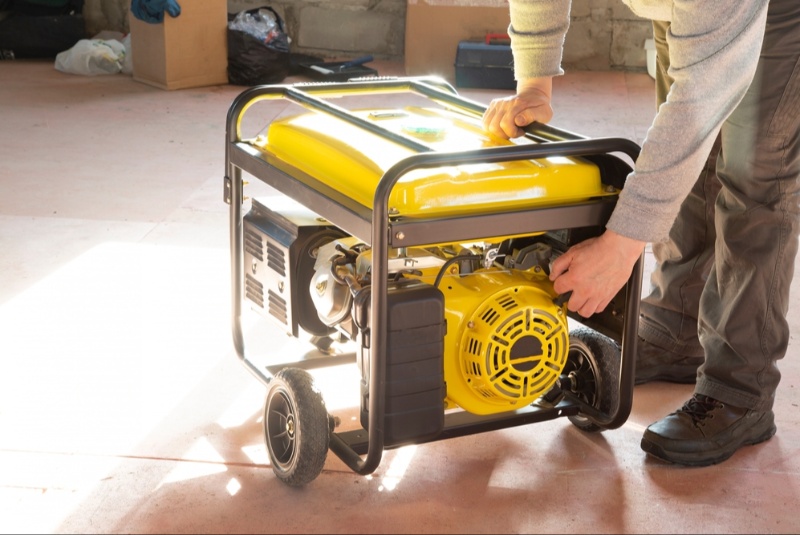In today's dynamic world, having a dependable source of power is not just a luxury but often a necessity. Whether you're preparing for an unexpected power outage, camping in the wilderness, or simply ensuring that your outdoor event has electricity, a reliable generator is a worthwhile investment. However, like any significant purchase, it's crucial to make an informed decision. This comprehensive guide provides valuable tips for purchasing a generator that best fits your needs, ensuring that you have access to reliable power when you need it the most.
1. Determine Your Power Needs
Before embarking on your generator purchase journey, it's essential to thoroughly assess your power needs. Understanding your requirements will help you select the right generator size and capacity to meet your specific demands. Consider the following factors:
Essential vs. Whole House: Define whether you want to power only essential appliances and devices (e.g., refrigerator, lights, and charging devices) or your entire home during an outage. Your choice will significantly impact the size and capacity of the generator you should buy.
Calculate Wattage: Every electrical appliance has a specific wattage requirement. Create a comprehensive list of all the appliances and devices you intend to run simultaneously during a power outage. Don't forget to account for starting wattage, which can be significantly higher than the running wattage for many appliances. Summing up the wattage requirements of all your devices will help you determine the generator capacity you need.
Future Needs: Think long-term. Consider whether there are appliances or tools you might add to your household in the future. It's wise to purchase a generator with some additional capacity to spare, ensuring that it can accommodate potential future additions to your power needs.
By carefully evaluating your power needs, you can make an informed decision about the generator size and capacity that will best serve your requirements.
2. Choose Between Portable and Standby Generators
Generators come in two primary categories: portable and standby. Each type has its own set of advantages and considerations, and the choice largely depends on your specific needs and preferences.
Portable Generators: These generators are typically gasoline-powered and are more affordable than their standby counterparts. They offer the flexibility of mobility, allowing you to move them to different locations as needed. Portable generators are ideal for powering essential appliances and devices during short-term outages. However, they require manual start-up when the power goes out and should be placed at least 20 feet away from your home to prevent carbon monoxide poisoning.
Standby Generators: Standby generators are permanent installations that are connected to your home's electrical system. They are designed to automatically turn on when a power outage occurs, providing continuous power without the need for manual intervention. Standby generators are more powerful than portable models and can run on natural gas or propane. While they tend to be more expensive and require professional installation, they offer the convenience of seamless, hands-free operation, making them suitable for whole-house power backup.
The choice between portable and standby generators depends on your specific requirements, budget, and preferences. Carefully consider the advantages and limitations of each type to determine which best aligns with your needs.

3. Fuel Type Matters
Generators run on various types of fuels, each with its own set of advantages and considerations. The choice of fuel type can significantly impact the generator's performance, availability, and environmental impact. Here are the primary fuel options for generators:
Gasoline: Gasoline is a widely available fuel source, making it convenient for portable generators. However, gasoline has a relatively short shelf life and can deteriorate over time, potentially causing starting and running issues. If you opt for a portable gasoline generator, be prepared to store and rotate fuel regularly to maintain its freshness.
Diesel: Diesel generators offer better fuel efficiency compared to gasoline generators. They are known for their reliability and durability. However, diesel fuel can sometimes be more expensive than gasoline, and diesel generators may emit more pollutants. Consider diesel generators for applications where fuel efficiency is a priority.
Propane: Propane is a clean-burning fuel that has an indefinite shelf life when stored properly. Propane generators are known for their environmental friendliness and long-term fuel storage capabilities. They are an excellent choice if you prioritize clean energy and extended fuel availability.
Natural Gas: If your home is equipped with a natural gas line, a natural gas generator can be a convenient and cost-effective choice. Natural gas is a clean-burning fuel and is delivered through a dedicated pipeline, ensuring a continuous supply during power outages. Natural gas generators are often used for whole-house backup systems.
When choosing a generator fuel type, consider factors such as availability, cost, storage requirements, and environmental impact to make an informed decision that aligns with your needs and preferences.
4. Noise Levels
Generators can be noisy when in operation, and noise levels can be a significant consideration, especially if you live in a densely populated area or plan to use the generator during nighttime hours. Generator noise is typically measured in decibels (dB), and it's essential to check the dB rating when evaluating generator models.
Modern generator manufacturers are increasingly focusing on noise reduction technologies to produce quieter generators. If noise is a concern, look for generators specifically designed for quiet operation. These models often feature sound insulation, advanced mufflers, and low-noise engines, making them more suitable for residential areas and noise-sensitive environments.
By prioritizing quiet operation, you can ensure that your generator doesn't disturb your neighbors or disrupt your peaceful surroundings when in use.
5. Safety Features
Safety should always be a top priority when purchasing a generator, as it plays a crucial role in protecting your home and those who use it. Look for generators that offer the following safety features:
Automatic Shut-off: A generator with an automatic shut-off feature will turn off the engine if it overheats or if oil levels drop too low. This safety mechanism helps prevent engine damage and reduces the risk of fire or other hazards.
Carbon Monoxide (CO) Detection: Carbon monoxide is a silent, odorless gas that can be produced by generators during operation. Exposure to high levels of CO can be life-threatening. Some modern generators come equipped with built-in CO detectors that will shut off the generator if harmful CO levels are detected, providing an additional layer of safety.
Ground Fault Circuit Interrupters (GFCIs): GFCIs are electrical safety devices that protect against electric shock. Generators equipped with GFCIs can automatically detect and shut off power when a fault is detected, reducing the risk of electrical accidents.
Prioritizing generators with these safety features ensures that you have reliable safeguards in place to protect both your property and the well-being of those who interact with the generator.
6. Maintenance and Warranty
To ensure the longevity and reliable performance of your generator, regular maintenance is essential. Proper maintenance not only extends the lifespan of the generator but also enhances its reliability during critical situations. Consider the following aspects related to maintenance and warranty:
Maintenance Kits: Some generator manufacturers offer maintenance kits that contain everything you need for regular upkeep. These kits often include items such as oil, air filters, spark plugs, and other essential components. Investing in a maintenance kit can simplify the maintenance process and help you stay on top of necessary tasks.
Warranty: A reliable generator should last you many years, but it may require periodic servicing or repairs. A good warranty indicates that the manufacturer stands by their product and is willing to support you in case of any issues. When evaluating generators, look for warranties that last several years and cover both parts and labor. A longer and more comprehensive warranty provides added peace of mind and protection for your investment.
By proactively maintaining your generator and taking advantage of warranty coverage, you can ensure that your generator remains in optimal condition and ready to provide power when needed.
Purchasing a generator is a significant investment that goes beyond mere convenience—it's about ensuring that you have access to reliable power when you need it the most. With the comprehensive guidance provided in this article, you're well-equipped to navigate the world of generators effectively and make an informed decision.
Remember that selecting the right generator is not just a technological choice; it's a decision that directly impacts your access to essential power, your safety, and your peace of mind. By thoroughly understanding your power needs, carefully considering fuel types, prioritizing safety, researching thoroughly, and factoring in ongoing costs and after-purchase support, you can confidently choose a generator that enhances your preparedness for unexpected outages and power needs.
Your generator should be more than just a machine; it should be a dependable source of power that you can rely on during critical moments. Make your choice wisely, and let your generator be your reliable companion, ensuring that you have the power you need, precisely when you need it.




